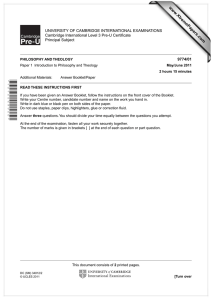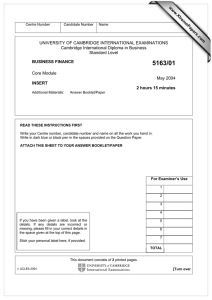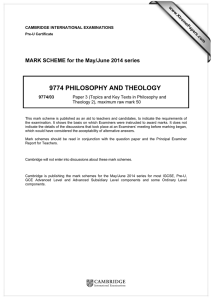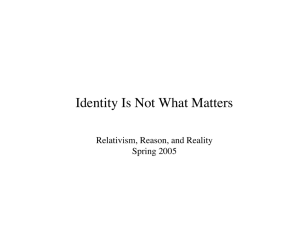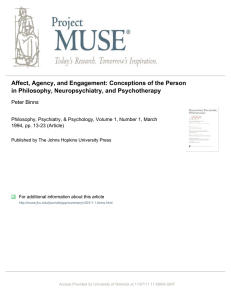www.XtremePapers.com
advertisement
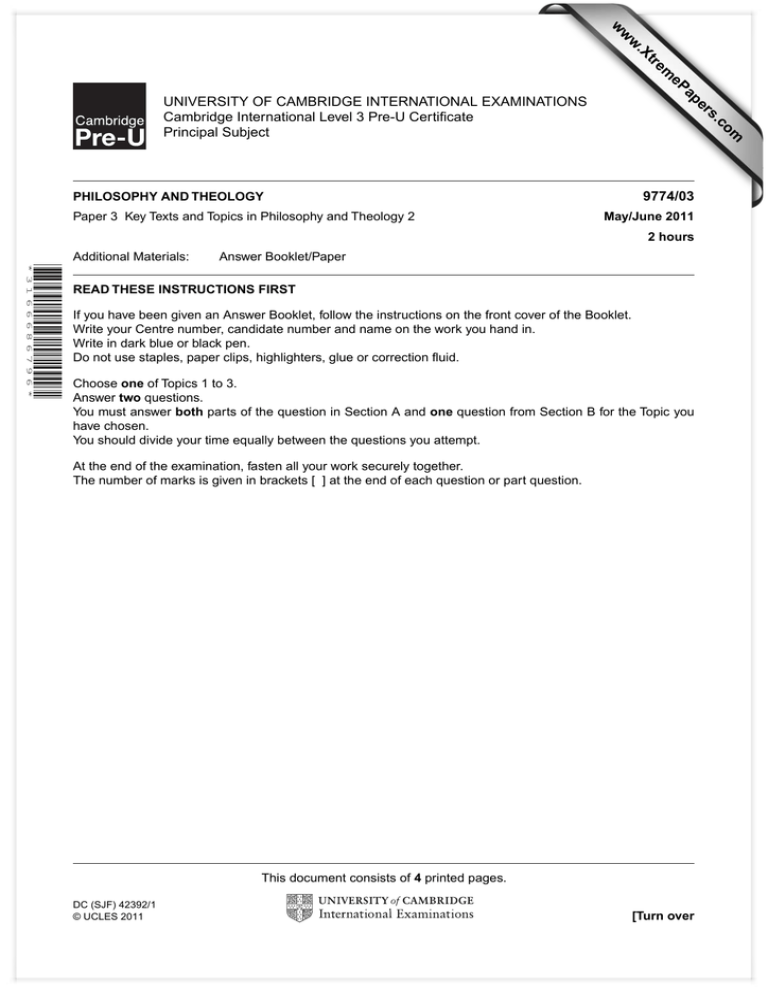
w w ap eP m e tr .X w om .c s er UNIVERSITY OF CAMBRIDGE INTERNATIONAL EXAMINATIONS Cambridge International Level 3 Pre-U Certificate Principal Subject 9774/03 PHILOSOPHY AND THEOLOGY Paper 3 Key Texts and Topics in Philosophy and Theology 2 May/June 2011 2 hours Additional Materials: Answer Booklet/Paper * 3 1 6 6 6 8 6 7 9 6 * READ THESE INSTRUCTIONS FIRST If you have been given an Answer Booklet, follow the instructions on the front cover of the Booklet. Write your Centre number, candidate number and name on the work you hand in. Write in dark blue or black pen. Do not use staples, paper clips, highlighters, glue or correction fluid. Choose one of Topics 1 to 3. Answer two questions. You must answer both parts of the question in Section A and one question from Section B for the Topic you have chosen. You should divide your time equally between the questions you attempt. At the end of the examination, fasten all your work securely together. The number of marks is given in brackets [ ] at the end of each question or part question. This document consists of 4 printed pages. DC (SJF) 42392/1 © UCLES 2011 [Turn over 2 Choose one of Topics 1 to 3. Answer two questions. You must answer both parts of the question in Section A and one question from Section B for the Topic you have chosen. You should divide your time equally between the questions you attempt. Topic 1 Philosophy of Mind Answer Question 1 and either Question 2 or Question 3. Section A Some recent medical cases provide striking evidence in favour of the Reductionist View. Human beings have a lower brain and two upper hemispheres, which are connected by a bundle of fibres. In treating a few people with severe epilepsy, surgeons have cut these fibres. The aim was to reduce the severity of epileptic fits, by confining their causes to a single hemisphere. This aim was achieved. But the operations had another unintended consequence. The effect, in the words of one surgeon, was the creation of ‘two separate spheres of consciousness’. [Extract from Derek Parfit: Reasons and Persons: 245] 1 Parfit refers here to the “Reductionist View” of mind. (a) (i) (ii) Explain briefly why Parfit’s view of mind is reductionist. Using one of Parfit’s thought experiments, show how Parfit uses the idea that the brain might contain “two separate spheres of consciousness” to support his reductionist view of persons. [10] (b) Critically assess Parfit’s view that with persons, what really matters is not personal identity, but psychological connectedness. [15] Section B 2 ‘The explanatory weakness of substance dualism means that it fails as a theory of mind.’ Discuss. [25] OR 3 Critically assess functionalism as a theory of mind. © UCLES 2011 9774/03/M/J/11 [25] 3 Topic 2 Ethics Answer Question 4 and either Question 5 or Question 6. Section A Consequently, when I recognise, as entirely authentic, that man is a being whose existence precedes his essence, and that he is a free being who cannot, in any circumstances, but will his freedom, at the same time I realize that I cannot not will the freedom of others. Thus, in the name of that will to freedom which is implied in freedom itself, I can form judgments upon those who seek to hide from themselves the wholly voluntary nature of their existence and its complete freedom. Those who hide from this total freedom, in a guise of solemnity or with deterministic excuses, I shall call cowards. Others, who try to show that their existence is necessary, when it is merely an accident of the appearance of the human race on earth – I shall call scum. But neither cowards nor scum can be identified except upon the plane of strict authenticity. Thus, although the content of morality is variable, a certain form of this morality is universal. Kant declared that freedom is a will both to itself and to the freedom of others. Agreed: but he thinks that the formal and the universal suffice for the constitution of a morality. We think, on the contrary, that principles that are too abstract break down when we come to defining action. To take once again the case of that student; by what authority, in the name of what golden rule of morality, do you think he could have decided, in perfect peace of mind, either to abandon his mother or to remain with her? There are no means of judging. The content is always concrete, and therefore unpredictable; it has always to be invented. The one thing that counts, is to know whether the invention is made in the name of freedom. [Extract from John-Paul Sartre: Existentialism and Humanism: 62-63] 4 (a) Examine how Sartre defends his theory of choice in this passage. [10] (b) ‘No rule of general morality can show you what you ought to do.’ (Jean-Paul Sartre: Existentialism and Humanism: 43). Evaluate this claim with respect to the general rule of morality against killing the innocent. [15] Section B 5 Consider the view that virtue ethics is the most useful ethical theory when considering business ethics. [25] OR 6 Critically examine Kant’s attempt to put forward a theory of morality based on reason. © UCLES 2011 9774/03/M/J/11 [25] [Turn over 4 Topic 3 Old Testament: Prophecy Answer Question 7 and either Question 8 or Question 9. Section A 2When the Lord first spoke through Hosea, the Lord said to Hosea, “Go, take for yourself a wife of whoredom and have children of whoredom, for the land commits great whoredom by forsaking the Lord.” 3So he went and took Gomer daughter of Diblaim, and she conceived and bore him a son. 4And the Lord said to him, “Name him Jezreel; for in a little while I will punish the house of Jehu for the blood of Jezreel, and I will put an end to the kingdom of the house of Israel. 5On that day I will break the bow of Israel in the valley of Jezreel.” 6She conceived again and bore a daughter. Then the Lord said to him, “Name her Lo-ruhamah, for I will no longer have pity on the house of Israel or forgive them. 7But I will have pity on the house of Judah, and I will save them by the Lord their God; I will not save them by bow, or by sword, or by war, or by horses, or by horsemen.” 8When she had weaned Lo-ruhamah, she conceived and bore a son. 9Then the Lord said, “Name him Lo-ammi, for you are not my people and I am not your God. [Hosea 1: 2-9] 7 (a) Consider the meaning of this passage in relation to the rest of the book of Hosea. [10] (b) Critically assess the view that in Hosea’s prophecy love is stronger than judgement. [15] Section B 8 Critically examine the roles of the ro’eh, hozeh and nabi’ in the development of Old Testament Prophecy. [25] OR 9 Critically examine the content, structure and meaning of prophetic call narratives or the nature and meaning of symbolic acts in pre-exilic prophecy. [25] Copyright Acknowledgements: Question 1 Question 4 Question 7 © Derek Parfit; Reasons and Persons; Oxford Paperbacks, Oxford University Press; 1986. © John-Paul Sartre; Existentialism and Humanism; Methuen Publishing Ltd; 1974. © New Revised Standard Version of the Bible; Division of Christian Education of the National Council of the Churches of Christ in the USA; 1989. Permission to reproduce items where third-party owned material protected by copyright is included has been sought and cleared where possible. Every reasonable effort has been made by the publisher (UCLES) to trace copyright holders, but if any items requiring clearance have unwittingly been included, the publisher will be pleased to make amends at the earliest possible opportunity. University of Cambridge International Examinations is part of the Cambridge Assessment Group. Cambridge Assessment is the brand name of University of Cambridge Local Examinations Syndicate (UCLES), which is itself a department of the University of Cambridge. © UCLES 2011 9774/03/M/J/11
